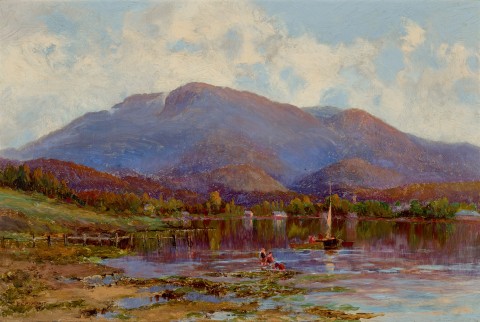MT WELLINGTON FROM NEW TOWN BAY, c.1898
WILLIAM CHARLES PIGUENIT
oil on canvas
30.5 x 45.0 cm
signed lower left: W C PIGUENIT
bears inscription on label verso: William Charles Piguenit / MOUNT WELLINGTON FROM / NEW TOWN BAY / c. 1898
Private collection
Sotheby’s, Melbourne, 6 April 1987, lot 52A (as ‘Mount Wellington from New Town Bay, Tasmania’)
Private collection
Christie’s, Melbourne, 28 July 1991, lot 17
Private collection
Sotheby’s, Melbourne, 30 April 2002, lot 68
The Cbus Collection of Australian Art, Melbourne, acquired from the above
Overland, Latrobe Regional Gallery, Victoria, 10 March – 15 July 2012
on long term loan to the Queen Victoria Museum & Art Gallery, Tasmania
Nainby, B., Stanhope, Z., and Furlonger, K., The Cbus Collection of Australian Art, in association with Latrobe Regional Gallery, Melbourne, 2009, pp. 14, 230
Mount Wellington from New Town Bay, 1879, oil on canvas, 47.3 x 70.3 cm, in the collection of the National Gallery of Victoria, Melbourne
The towering presence of kunanyi, Mount Wellington, above the waters of timtumili minanya, the Derwent River, had always been a rich source of subject matter for colonial artists, including John Glover, John Skinner Prout, Knud Bull, Henry Gritten and Eugene von Guérard. Unlike these earlier artists, however, William Charles Piguenit had been born in Hobart and spent over half of his long life in kunanyi’s shadow. It is not surprising that some of his earliest displayed works of art – lithographs prepared with his cousin and later brother-in-law, Alfred Randall – depict this mountain.1 Its dominant presence was a forerunner to the impressive geological formations that Piguenit travelled to in remote areas of Tasmania and in New South Wales, which formed the subject matter upon which his critical and commercial success was based.
Throughout his artistic career, Piguenit painted kunanyi from a variety of locations, as he was later to do of Turrumburra, Lane Cover River, near his house in Sydney (see lot 5). A number of these paintings, such as Mount Wellington from Kangaroo Bay, Tasmania, 1884 (Tasmanian Museum and Art Gallery) are expansive views from the eastern banks of the river towards the distant township. In contrast, this smaller work is a more concentrated and intimate depiction, looking along the inlet of New Town Bay towards the rolling foothills. The purple, morning-hazed folds of the mountain here suggest an element of protection rather than domination, the autumnal colours lining the shore evidence of introduced trees and established gardens, settlement rather than wilderness. The vibrant points of colours of the trio of children playing in the tidal mudflats and aboard the boats focus the eye at the point where the horizontal and vertical strokes of the watery reflections meet.2 Piguenit often varied the brushstrokes in his oil paintings: sometimes immaculately smooth, at other times textural to convey turbulent weather conditions or vegetation. The freedom of application and freshness of colours in this painting are notable within his oeuvre of often-sombre scenes of awe-inspiring grandeur and dramatic environs.
1. These 1870 prints are now rare: examples are held in the Crowther Library, Libraries Tasmania, Hobart. Although Piguenit’s later art was widely reproduced, he did not continue with lithography as an artistic medium.
2. The freedom of Piguenit’s brushstrokes in this painting contrast with another New Town Bay view dated 1879 in the collection of the National Gallery of Victoria which is surprisingly static in composition and style. Comparing the two, however, does show that Piguenit took liberties with the accuracy of his locations for aesthetic effect.
ALISA BUNBURY
